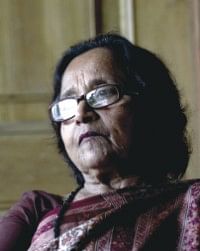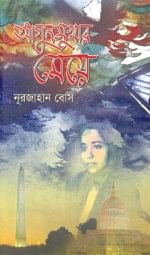| Home - Back Issues - The Team - Contact Us |
 |
| Volume 10 |Issue 09| March 04, 2011 | |
|
|
Profile Beyond the Doll's House Nurjahan Bose has recently come into the spotlight following the publication of her autobiography. She is the kind of woman who practises what she preaches. Rifat Munim It's exhilarating to be alive in a time of awakening consciousness; it can also be confusing, disorienting, and painful. This awakening of dead or sleeping consciousness has already affected the lives of millions of women, even those who don't know it yet. It is also affecting the lives of men, even those who deny its claims upon them. Adrienne Rich, 'When We Dead Awaken: Writing as Re-Vision'
Even a couple of years ago, a remote village named Hatiandha in Natore was one of the most conservative areas with women giving in to all forms of male domination including domestic violence and forced, verbal divorce. Little wonder that such a place would shut in women in what was a 'zenana' in Begum Rokeya's time. But in a span of two years, a silent but tangible revolution has taken place. Now while walking through the streets and market place of Hatiandha, you will be surprised to see women, young or old, seek education at an elderly education centre, take up various income-generating projects such as weaving, take charge of a big shop, and most important of all, raise their voice, whenever necessary, against forced divorce and so on. Not that the area has been emptied by men, and local imams and moulabhis. On the contrary, women have been integrated into the society through a process of 'awakening of dead or sleeping consciousness' that was challenged by some but supported by most men. “How was it possible?” I ask Nurjahan Bose, the woman behind this revolution at Hatiandha. Seeing her contemplate, I think perhaps I am given a chance to elucidate my point. Extending a little, I ask again, “How could you harmonise the imams and the pious elders with working women in a place that hasn't seen women come out of their house in a thousand years?” Rising out of her contemplation, she looks me in the face, and says, “I was knee-deep in politics as a student, and later as a teacher in Barisal. So I know how to organise people with conflicting interests and bring them under the same roof.” Nurjahan Bose is an activist who single-handedly formed Sanghati and Aasha, two non-profit organisations, to help empower and protect thousands of women in home and abroad. Apart from these organisational approaches, she had also been at the forefront of numerous humanitarian activities throughout her life. Sanghati, since its formation in 1984, did not have a working base in Dhaka since Bose had been living in the United States at that time. So she started raising fund and handed over no less than one lakh and seventy thousand US dollars to Mahila Samity in different periods till 1999.
But life of the 73-year-old woman who has landed up being a busy activist with two massive projects and numerous smaller ones was an eventful one, full of vicissitudes, struggles and sacrifices, a life that is worth telling to all, especially to those women who do not want to spend their life performing the prescribed feminine roles by just cooking and bringing up their children. But let that tale be unfolded with the chapters of her autobiography Agunmukhar Meye that won her the Ananya Literature Award 2010. She was born in a secluded village named Kantakhali at Boro Baishdia, an island in the Bay of Bengal under Galachipa Upazila in the district of Patuakhali. Cut off from downtown, there were no schools in that char. Although there was a touch of cultural activities, hers was a conservative Muslim family dominated by traditional norms where a man usually has several wives and girls are subject to early marriage, even before reaching puberty. Going against the family norms, her mother sent her to a school in Patuakhali. During this time 10-year-old Bose, who was already shattered to see the vilest forms of patriarchal repression in family and society at large, faced molestation from one of her grandfathers on the mother's side that left an indelible mark on her psyche, and carved a devastating effect on her psychic growth as was revealed later in the book. At this time, her family pressure mounted for her marriage. But her mother's strong will along with hers saved her again and she went to Barisal to finish her matriculation. When she was 16, she fell in love with Emadullah, the general secretary of East Pakistan Jubo League, and got married to him with her family's consent. But Emadullah died from chickenpox in a year when she was pregnant. After such a blow, she found herself thrown into a sea of troubles. Giving birth to her first child Jasim, she took a job as a hostel super at a school and tried to stand on her own. This was the beginning of her life as a political activist when she got involved with Swadesh Bose, her late husband's closest friend. But her involvement with Swadesh enraged Muslim communal rioters, a situation that revealed to her how deeply communalism was rooted in our society. At this time, she also realised how difficult it was for a single mother with a child to continue her life without getting married. As Swadesh was Hindu, her family did not consent to her marriage with him. But much like the wild Agunmukha, a river flowing beside her village, she was blessed with an indomitable spirit that guided her through all obstacles. So only with her mother's consent, she took her own decision, and married Swadesh in 1963. Then after a stint in Karachi, they went to Cambridge, England as Swadesh won a scholarship for his Phd. Returning from there in 1967 they settled in Karachi. After that they got back to Dhaka in the face of the liberation war. Meanwhile she gave birth to two daughters, Mini and Anita. After the war ended, they went to Oxford, England and from there to Washington, US where Swadesh picked a job with the World Bank. Once she got into her stride with her familial responsibilities, she first completed her master's degree from an American university and began her career as a social worker with a Catholic Charity Refugee Program. In course of time, she realised that subjugation of women has no border; it was rather a universal phenomenon. Although there are stronger laws in England and the US, women are also suppressed there in a variety of ways. So her versatility coupled with her commitment reignited her passion again. Soon with the help of a number of her foreign friends, she formed Sanghati and Aasha which are now operating effectively in Bangladesh and US. With her experience of working with the likes of Manorama Basu, raising fund was not much of a problem. The activist turned writer, in recounting the events of her life, has spared none. With her Marxist-feminist gaze keeping wide-awake, she has ruthlessly criticised men whomsoever because of their discriminative stance against women. She has reprimanded Emadullah for his sadism and Swadesh for some of his feudal attitudes. Although on many occasions, the author remarkably digresses to other subjects, undermining the unity of an otherwise intriguing talse, what makes it a special read is her commitment to life and her dedication to the women's cause. Bose, who is in her 70s at present, lives in Dhaka now and flies to the US once a year to raise fund for her NGOs. Despite rampant news of acid and rape victims, it is precisely because of dedicated activists such as her that women's condition is improving in our country. With the International Women's Day only three days ahead, the veteran activist leaves her message for the present generation, “I know women – both in cities and villages – still face severe mental as well as physical torture. Yet, a change is visible even in the remote villages. That is not to say, I'm complacent. Now educated people, especially women, should try from their respective positions to empower women from lower classes because until you raise your voice and put pressure, the authorities will not pay any attention to your plights. So if everyone comes forward, I'm sure that the already visible change will soon take on a massive achievement in women's empowerment.” Copyright
(R) thedailystar.net 2010 |

 “When I saw that Mahila Parishad needed no more support and can run well on its own, I started to concentrate on establishing and spreading rural Sanghati's activities in rural Bangladesh,” she says. “There are thousands of women from Bangladesh, India and Pakistan who live in America and face domestic violence. Aasha, a US based NGO, provides them with an all-out support including shelter and legal steps.”
“When I saw that Mahila Parishad needed no more support and can run well on its own, I started to concentrate on establishing and spreading rural Sanghati's activities in rural Bangladesh,” she says. “There are thousands of women from Bangladesh, India and Pakistan who live in America and face domestic violence. Aasha, a US based NGO, provides them with an all-out support including shelter and legal steps.”